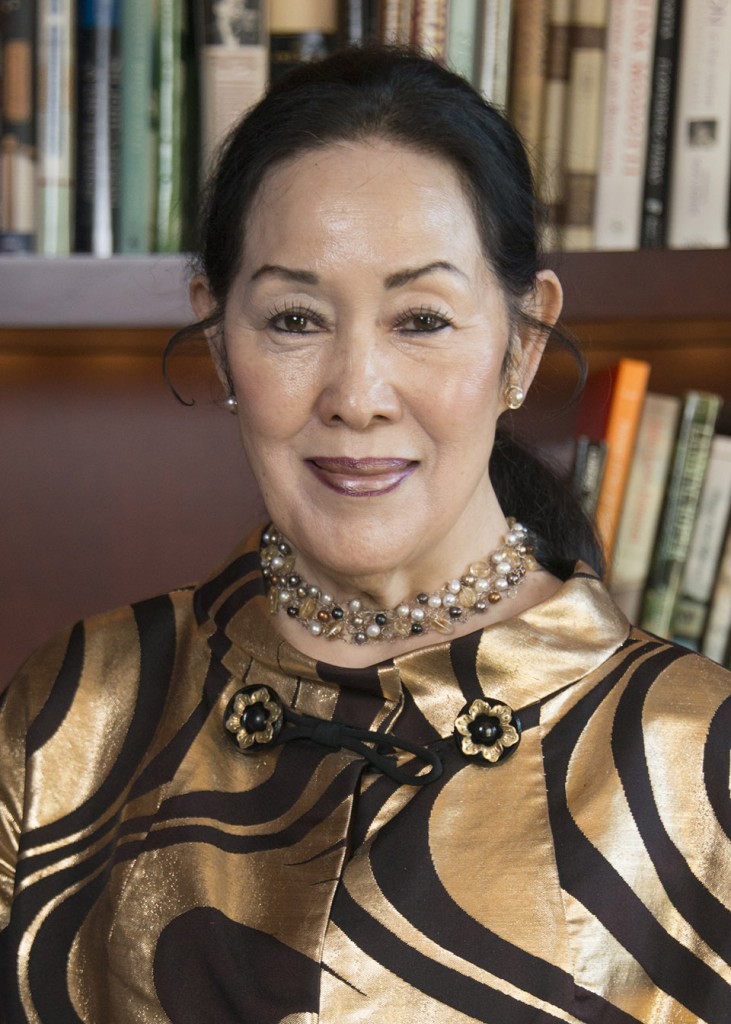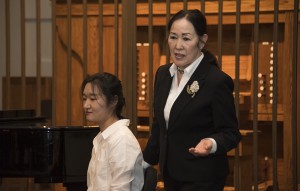CSUN Recital Hall to be Named in Honor of Opera Legend Shigemi Matsumoto

Opera legend Shigemi Matsumoto and her husband Marty Stark have donated nearly $1.5 million to CSUN’s music program. The university is naming a recital hall in her honor. Photo by Lee Choo
While a student at what was then known as San Fernando Valley State College — now California State University, Northridge — Shigemi Matsumoto gained the knowledge and inspiration needed to command stages worldwide and become a legendary singer.
Recognizing the important role the college played in establishing her as one of the leading operatic voices of her generation, Matsumoto and her husband, Marty Stark — whom she met while both were students at Valley State — have donated nearly $1.5 million for the creation of the Shigemi Matsumoto Recital Hall Fund and the Shigemi Matsumoto Recital Hall Endowment in the Mike Curb College of Arts, Media, and Communication.
In recognition of the gift and the contributions Matsumoto has made to the world of music and as a music educator, CSUN is naming the recital hall in the Department of Music in her honor. The formal renaming ceremony will take place later this year.

Shigemi Matsumoto speaks to students after a performance by CSUN student Jingling Gu in 2017.
“We are deeply honored that Shigemi Matsumoto and her husband, Marty Stark, have chosen to give back to CSUN and our students in such an impactful way,” said CSUN President Erika D. Beck. “Their generosity to the university ensures that those following in their footsteps will have the support they need to achieve their academic and creative goals.
“During her years on stage and her nearly 40 years in music education, Shigemi defied stereotypes with her talent and success,” Beck continued. “In naming the recital hall for Shigemi Matsumoto, we are not only honoring her legacy, but recognizing her as an inspiration for generations of CSUN students to come.”
Matsumoto and Stark said they were touched by the renaming.
“This naming of the Shigemi Matsumoto Recital Hall really honors my parents, Moriichi and Suki Matsumoto, who were interned during World War II, and who devoted so much to my upbringing, early training and ultimately my life,” said Matsumoto, who graduated from CSUN in 1968 and received a CSUN Distinguished Alumni Award in 2016.
Stark said the naming of the hall in his wife’s honor also serves as “a testament to how we met as students at Valley State College, married and eloped to start our lives together. I have been by her side all these years to support her lifetime ambitions.”
Stark was a business executive, vice president of Columbia Artists Management, Inc. (CAMI), an international management consultant, mentor to many startup companies and regularly contributes his time to CSUN’s David Nazarian College of Business and Economics.
After the end of WWII, Moriichi and Suki Matsumoto adopted Shigemi in Denver. The family moved west and settled in Reseda, and the Matsumotos opened a beauty salon in Tarzana.
Shigemi Matsumoto enrolled at San Fernando Valley State College as a history major. During a faculty appreciation dinner she was asked to sing. Her performance caught the ear of a faculty member, who suggested she talk to music professor David Scott. Scott had joined the college’s faculty in 1963 as the school’s first full-time voice teacher and was working to build its opera program.
A conversation with Scott convinced Matsumoto to switch her major to music. Her voice and dedication to her craft quickly established the foundation for what would become one of the nation’s leading collegiate opera programs and set Matsumoto on a path toward international acclaim.
Her first role while in college was as Mimi in “La Bohème.” She would eventually sing six major roles at CSUN. While still a student she won the regional Metropolitan Opera auditions, and a year later, at age 22, she won the grand prize in the San Francisco Opera National Auditions and earned her first professional contract with a major international opera company. She made her company debut as Gerhilde in the San Francisco Opera’s production of Wagner’s “Die Walküre.” She went on to sing with the San Francisco Opera for the next seven years.
Over the following two decades, she sang with more than 50 national and international opera companies and international symphony orchestras and gave more than 300 solo recitals throughout the world. Throughout her career, she was managed by one of the most influential classical music managers of the 20th century, Nelly Walter, vice president of Columbia Artists Management, Inc. Shigemi was the first Japanese American — and the first Asian American — to have an international performing singing career.
Over the course of her career she sang in opera productions with each of the Three Tenors — Luciano Pavarotti, Placido Domingo and José Carreras — and appeared on albums with Pavarotti and with the NBC Orchestra.
Since the late 1980s, Matsumoto has devoted her work to music education, teaching at Cal State Long Beach, the University of Southern California and CSUN. She also founded and was president of the Southern California–based Classical Singers Association, a nonprofit organization dedicated to developing the performance and professional singing skills of its members. The organization was active for over 20 years.
“Shigemi and Marty reconnected to CSUN through professor Diane Roscetti’s invitation to Marty to speak to her Music Entrepreneurship class about his own rewarding career,” said Dan Hosken, dean of the Mike Curb College. “That later led to an invitation to Shigemi to join CSUN’s Vocal Arts faculty in 2018.”
“I’m thrilled that we are able to name the recital hall in Shigemi’s honor,” Hosken continued. “From humble beginnings to performing on stages around the world, Shigemi embodies the future that we hope for all of our students, and now they can envision their own success by performing in the venue that bears her name.”

 experience
experience